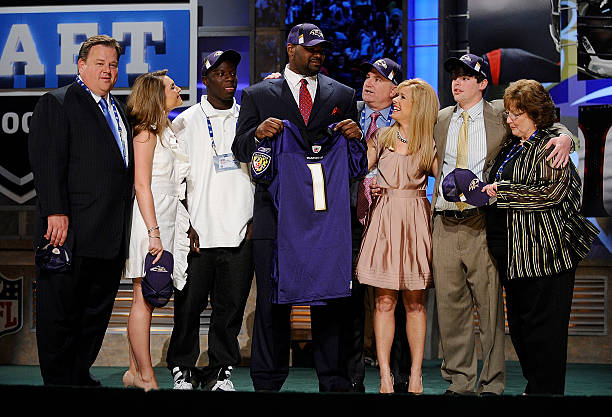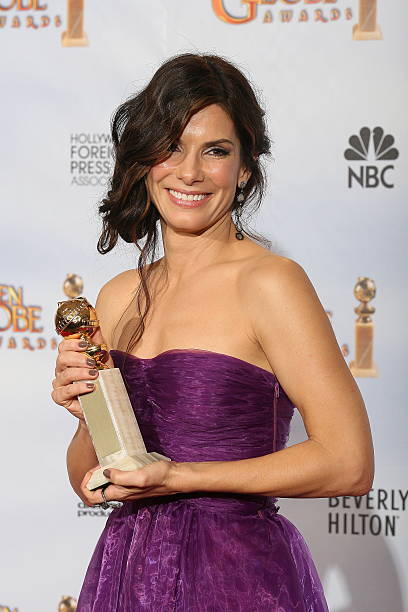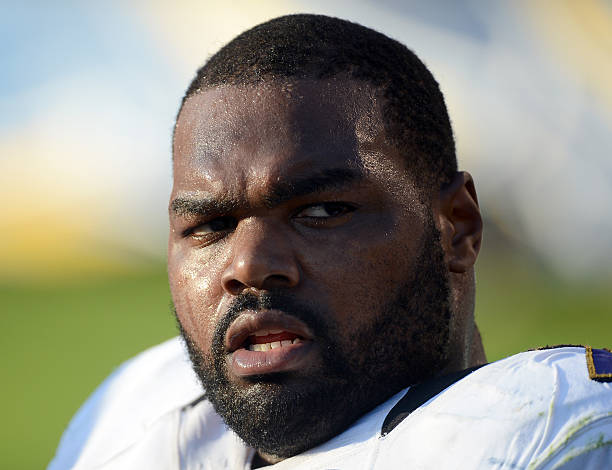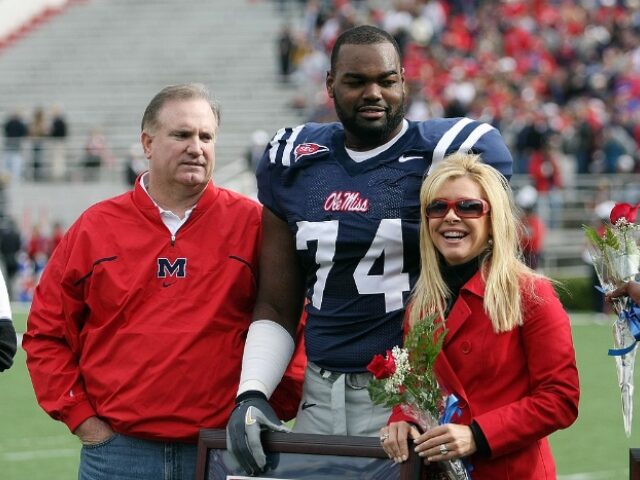Former NFL player Michael Oher, who became famous as the downtrodden black teen taken in by a white family and was the subject of the film, The Blind Side, is now suing the Tuohy family, saying that they lied about having adopted him into their family and have been stealing money from him for more than a decade.
Oher was a teen football player for a top private high school in Memphis, Tennessee, when the Tuohy family first met him. But despite his standout sports achievements, Oher had a chaotic home life with a mother who struggled with drug addiction. Eventually, the Tuohys took Oher in and helped support him as he became a college football star and eventually an NFL player, ESPN reported.

Baltimore Ravens #23 draft pick Michael Oher poses for a photograph with his family at Radio City Music Hall for the 2009 NFL Draft on April 25, 2009, in New York City (Jeff Zelevansky/Getty Images)
The Tuohys always told Oher that they legally adopted him into the family, and that relationship formed the basis of the feel good 2009 film starring Sandra Bullock and Quinton Aaron. The Blind Side went on to earn $300 million and even more in home video sales. It also achieved high acclaim and won Sandra Bullock an Academy Award.

Actress Sandra Bullock poses with her award for best performance by an actress in a motion picture – drama for “The Blind Side” in the photo room at the 67th Annual Golden Globe Awards at the Beverly Hilton Hotel in Beverly Hills, California, January 17, 2010. (VALERIE MACON/AFP via Getty Images)
But Oher now says he didn’t benefit at all from the millions that the film earned. On top of that, he alleges that the entire Tuohy family raked in hundreds of thousands while he got nothing.
In addition, Oher claims he has since discovered that despite what the Tuohys have always said — and despite what is claimed in books and in the film — Sean and Leigh Anne Tuohy never did adopt him into the family. Instead, they had him sign a conservatorship document when he was a teen that gave them the legal right to control his finances and any business deals in his name. And now he is suing to get what is his.
“The lie of Michael’s adoption is one upon which Co-Conservators Leigh Anne Tuohy and Sean Tuohy have enriched themselves at the expense of their Ward, the undersigned Michael Oher,” the ex-NFL player’s lawsuit says. “Michael Oher discovered this lie to his chagrin and embarrassment in February of 2023, when he learned that the Conservatorship to which he consented on the basis that doing so would make him a member of the Tuohy family, in fact, provided him no familial relationship with the Tuohys.”

Leigh Anne Tuohy celebrates on the field after her adoptive son Michael Oher #74 of the Baltimore Ravens and the Ravens defeat the San Francisco 49ers 34-31 during Super Bowl XLVII at the Mercedes-Benz Superdome on February 3, 2013, in New Orleans, Louisiana. (Ronald Martinez/Getty Images)
Oher’s lawsuit asks a court to end the Tuohy’s ability to make money off his name, story, and likeness and demands that they pay him a fair share of the profits they have earned during all these years.
The former player says that the Tuohys told him he was adopted and that the paper he signed made that legal. But he has found that there are key differences between an actual adoption and the conservatorship document he signed. In an actual adoption, he would retain the right to handle his own financial affairs. But under the conservatorship, those rights were specifically signed away to the Tuohys.
Oher also claims that the family members always told him that they never made much money from the film or the book that film was based upon. But his attorneys say that this is not true. “According to the legal filing, the movie paid the Tuohys and their two birth children each $225,000, plus 2.5% of the film’s defined net proceeds,” ESPN noted before pointing out that the movie earned in excess of $300 million.
The deal the Tuohys made allowed them to profit from the film, but the separate 2007 contract Oher supposedly signed appears to “give away” to 20th Century Fox Studios the life rights to his story “without any payment whatsoever,” Oher’s lawsuit states.

A portrait of Michael Oher #74 of the Baltimore Ravens during the game against the San Diego Chargers at Qualcomm Stadium on November 25, 2012, in San Diego, California. (Harry How/Getty Images)
Another suspicious aspect of the film deal is that the Tuohy adults and their two biological children are listed as being represented by Creative Artists Agency in the deal. Yet Oher is listed as being represented by Debra Branan, a Tuohy family friend and the woman who drew up the conservatorship that Oher supposedly signed back in 2004.
The Tuohys even claimed in writing that they only got a flat fee and did not benefit much from the film, as detailed in their 2010 book, In a Heartbeat: Sharing the Power of Cheerful Giving.
Oher also says that he feels that the movie negatively affected his NFL career because, even though he was academically successful in school, he was portrayed as a slow dullard in the 2009 movie. And that false reputation fostered by the film caused NFL coaches and bosses to assume he was not smart enough to be a leader.
Oher stressed that he is still grateful for much of what the family and film did for him. But he also feels betrayed.
“There has been so much created from The Blind Side that I am grateful for, which is why you might find it as a shock that the experience surrounding the story has also been a large source of some of my deepest hurt and pain over the past 14 years,” Oher wrote in his new book “When Your Back’s Against the Wall.”
“Beyond the details of the deal, the politics, and the money behind the book and movie, it was the principle of the choices some people made that cut me the deepest.”
Follow Warner Todd Huston on Facebook at: facebook.com/Warner.Todd.Huston, or Truth Social @WarnerToddHuston

COMMENTS
Please let us know if you're having issues with commenting.